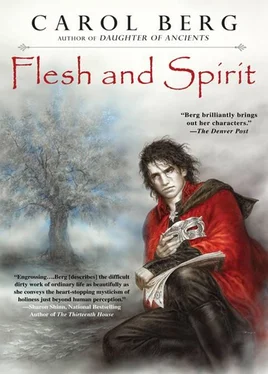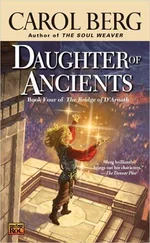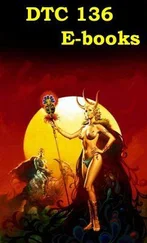The rain, now a downpour, had the gutterspouts flowing. Water had pooled in the alley and at the base of the ascending stair outside the door. Moisture spattered across the threshold as I awkwardly tried to draw my cowl over my ungainly armload of books, scrolls, and loose pages. Feeling the pureblood’s eyes on my back did not steady my hands. Crinkling his red-rimmed eyes in disapproval, the stoop-shouldered monk set down his ink basket, yanked the heavy wool across the jumble, and stuffed a wad of the cloth into my already over-occupied hand to hold it there.
The open air cooled my incipient fever. The pureblood could not possibly have recognized me.
The stair was not half wide enough to carry such a load. I must either risk tumbling over the open side of the steps or scrape arms and elbows on the wall, thus smearing moss onto my new cowl. At the top of the stair I pawed at the brass latch of the library door, at the same time drawing up my knee to catch some book that was sliding out of my arms. If I took another step, some precious writing was going to drop into the chilly puddle that was seeping into my new sandals around my bare toes. By the time Jullian pulled open the library door, I was crouched in an immovable knot.
The boy gaped as if I were a lunatic. I waggled my brows and my chin toward my laden arms, hoping he or one of the monks in the room would catch my meaning before the growing heat in my thigh burst into flame.
At last understanding dawned. Jullian reached under my dripping cowl and supported the collapsing bundle as I waddled through the doorway. As the monks resumed their studies, the boy rescued the most precariously poised texts. I dumped the rest of the stack on the table beside them.
The boy and I blotted stray droplets from sheets and folios with a kerchief, stacked the books, set aside the scrolls in their cloth or leather cases, and straightened the loose pages. We had reduced the clutter by half, when one brightly colored page caught my notice. As Jullian laid another page on the pile of loose sheets, I gripped his slender wrist and pulled it away, staring at the one atop the stack. The crisply white vellum depicted a detailed diagram of mill cogs, inked in bright red and blue. A square outlined in the text gaped empty, awaiting a second drawing. I shifted several more of the loose pages and found the half-completed list of carefully drawn numbers, a streak of black ink left where the page had been whipped out from under the hand of the copyist.
What had Brother Victor sent out to be burned? Certainly not the pages the hierarch had selected. With so many sheets piled on the table, perhaps the chancellor had picked up the wrong ones…or perhaps he had assumed that I, a befuddled novice of less than a day who had never worked in his scriptorium—and thus was not subject to questioning at the hierarch’s order—wouldn’t notice he had switched them.
My suspicions were quickly confirmed. We had just spread out the last few pages, careful of the still damp ink, when Brother Gildas hurried through the library door. He shooed a puzzled Jullian back to his books, wax tablet, and stylus—implements of torture familiar from my own boyhood—then gestured for me to bring the stacked pages. Producing a key from under his scapular, Gildas unlocked the inner grillwork door of the last book press on the south wall and stowed the suspect pages, slipping them between the books along with scraps of vellum he took from a basket to protect the drying ink. One would have to rifle the entire collection to discover the forbidden copies.
As Gildas locked the grate, shut the cupboard’s outer door, and shot its bronze bolt back into its catch, I noted the brass solicale affixed on the door—the abbot’s sign. So the contraband now lay hidden in the abbot’s own book press. Astonishing.
His back to the other three monks, Gildas held a finger to his mouth, laid his clenched fist on his breast, and flicked his eyes toward Jullian. His message was quite clear: silence, obedience, the boy’s safety. He waited, his dark brow raised in query.
I pressed my palms together and inclined my head. As in the matter of my book, my interests coincided with his demands. I was the least likely man in the abbey to carry tales to the hierarch or his lapdog. Yet only the time and company restrained my anger and resentment.
Vowing to lie in wait for the damnable monk after supper and force an explanation from him, I started out the door to find Brother Sebastian, while Gildas smiled cheerfully, drew up a stool next to Jullian, and began to inspect the boy’s work. And then the bells took up clanging. Not a call to the Hours—Nones had rung while I was with the hierarch in the scriptorium, and Vespers would not ring for at least an hour more. These bells stuttered in an unbalanced cadence that summoned the community to lay down whatever duties occupied the moment and gather at the refectory stair.
Everyone rose quickly, gathering their books and tablets and locking them away. But as Gildas and the other monks hurried out the door, I hung back. The bells would ring twice more, allowing time for scattered brethren to stopper their ink, damp cook fires, or round up sheep and goats, and I determined to take advantage of the opportunity. A matter more worrisome than frivolous copying or hidden pages preyed on my mind.
Jullian, scratching one bare, mud-spattered leg with his sandal, held the heavy door open, waiting for me. He blinked in surprise when I dragged him back into the room and pushed the door shut.
“A moment, if you would,” I whispered. No finger twiddling would suffice for this. “I need to speak with you, and as you’ve been avoiding me so purposefully, and my life seems like to get more complicated now I’m vowed, I think this will have to do.”
Pressing his back to the doorpost, the boy glanced up at me with the sidewise aspect of a thief caught. This would take some care.
I perched my backside on one of the library tables. “Tell me how you came to live in an abbey so young. Your family, I suppose. Dead, are they?” I’d wager my life on the answer to that one.
It certainly was not the question he expected. He stared for a moment, as if to read my intent. Then he shrugged. “Aye. Mam died birthing when I was six. My da was clerk to a wool factor in Pontia, or, well, he wasn’t actually my da, as mine was dead. He said he’d no will left to raise a boy that wasn’t his. So he gave me the choice to go on to Cradens Abbey school that’s in Pontia or to apprentice to a dyer, as that fee was the best he could afford to pay. I liked schooling, so it was no hard choice. I heard he left the factor not long after that and went off to the fighting. He’s likely dead now, too.”
He spoke with assurance, not loud, but not whispering either, bold in his secrets and brave in his lonely confession. I knew that not every family was as easy to leave behind as mine. And the story was plausible enough.
“And does Brother Gildas always supervise your schooling?”
“For the most. Brother Fidelio used to tutor me with Gerard, who is great of heart and beloved of Iero as he saw an angel once, but who is slow of eye and head when it comes to reading. We’d work here, and Brother Fidelio would allow me to read whatever I would from the shelves while he taught Gerard. But when Father Abbot found me reading Aurellian plays by Vocaachus and Aerno…” His face brightened. “Do you know them?”
I shook my head.
“Well, they are very…worldly. Frivolous, the hierarch would call them.” A trace of indignation in his posture. “But their words make music in your head and lead you to consider all manner of things. Father Abbot says they are worthy of study, but perhaps not for boys, even ones who read Aurellian fluently.” His enthusiasm quickly overruled his resentments. Neither secrecy nor resentment were at all his nature.
Читать дальше












